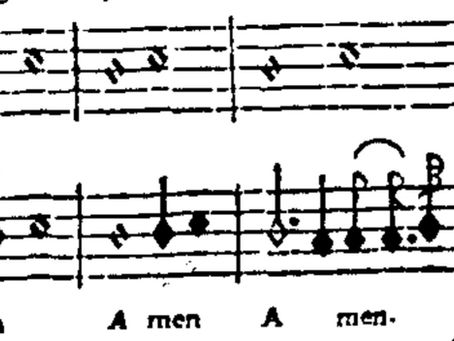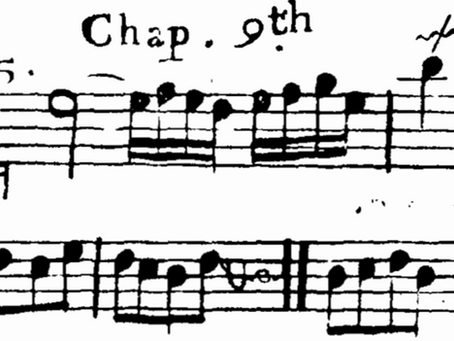top of page
Reimagining Historical Voices
Search


Georg Falck on the use of Extemporised Florid Ornaments and Trills in an Ensemble Setting (1688)
‘Although they are set only in the system of the cantus, these examples of accentus and variation of intervals can be used in the other...

Tim Braithwaite


Two Comments on Ensemble Singing by Joan Albert Ban (1642)
III. Diminution Diminution occurs when larger notes are broken into many parts by the smaller ones in motion. The which must not...

Tim Braithwaite


Pietro Reggio on Teaching the Trillo (1677)
‘Now let us proceed to teach a man to Trillo, and what he must do, for to come to do it well. The first Trial is as follows. Let any...

Tim Braithwaite


An Anonymous Set of Instructions for Ornamenting Plainchant (c.1475-1525)
[fol. 22r.] Chapter two: of the definition and the division of melodía Melodía is to adorn and to grace the sounds of plainchant. Melodía...

Tim Braithwaite


Bovicelli on the Graceful Placement of Certain Syllables (1594):
‘As for the disposition of the words under the notes, it is necessary to take great care to set them so well, that not only no barbarism...

Tim Braithwaite


The ‘Tedious’ Tempo of English Psalm Singing in the Early 18th Century
‘But the greatest Difficulty is to sound every Note according to its due Measure of Time; and here it is that the Singers in most Country...

Tim Braithwaite


Bottrigari on both Ensemble Ornamentation and ‘Odious’ (‘odiosa’) Improvised Counterpoint (1594)
‘[Alemanno Benelli:] But because of the presumptuous audacity of performers who try to invent passaggi, I will not say sometimes, but...

Tim Braithwaite


Conrad von Zabern on those who Deviate from Notated Plainchant Melodies (1474):
‘To sing with fidelity... is to sing so that anyone of those singing together should remain in the form of those notes that were...

Tim Braithwaite


Thomas Morley on the Perils of Many Singers ‘Singing on a Plainsong.’
'As for singing upon a plainsong, it has been in times past in England, as every man knows, and is at this day in other places, the...

Tim Braithwaite


Jean-Jacques Rousseau’s Definition of Chant sur le Livre:
‘Singing on the book. A Plainchant or counterpoint in four parts, which the musicians compose and sing impromptu on a single [part]:...

Tim Braithwaite


English Psalm Singers ‘Tearing with their Throats one Wretched Stave into an Hundred Notes’: (1708)
‘Then out the People yawl an hundred Parts, Some roar, some whine, some creak like the Wheels of Carts; Such Notes the Gam-ut yet did...

Tim Braithwaite


The Practices of ‘Lascivious’ Church Musicians as Described by Heinrich von Nettesheim (1532)
‘Today, music has such great license in churches that even along with the canon of the mass certain obscene little ditties sometimes have...

Tim Braithwaite


Adrianus Petit Coclico on the Art of Singing as (Supposedly) Taught by Josquin Dez Prez (1552):
‘To teach the art of singing well and elegantly to a boy, I advise first that he choose a teacher who sings pleasantly and sweetly with a...

Tim Braithwaite


Johann Samuel Petri’s Advice for Teaching a Congregation to Harmonise a Chorale Extempore (1767)
Question. How can one remedy the fault that a choir, when it sings a well-known church chorale without sheet music, as must often happen,...

Tim Braithwaite


Manuel Garcia on Changing or Replacing Words when Singing:
In altering or re-arranging words, or syllables, care should be taken to retain and mark the measure or accent of a melody, and only...

Tim Braithwaite


Giovanni Battista Martini on Singing ‘all’improvviso’ on a Cantus Firmus (1774):
'Among the compositions made above a cantus firmus by the masters of the art, those [made] above introits are unique, and are used...

Tim Braithwaite


Adriano Banchieri’s ‘Hundred Passaggi’:
‘The hundred passaggi above, all having been printed in various works by modern authors, have been assembled with much study and...

Tim Braithwaite


Reminiscences of a Cacophonous (!) way of ‘Singing on the Book’ in Early 19th-Century France
‘I know of no musician today who has any idea what it means to sing on the book. It was an improvised and simultaneous melody [chant]...

Tim Braithwaite


Do Tosi and his commentators prefer too many or too few ornaments?
I was recently flicking through an instruction book aimed at teaching modern singers how to ornament eighteenth-century repertoire, and I...

Tim Braithwaite


Giovanni Bardi Discussing Good and Bad Singing in a Letter to Giulio Caccini (c.1578)
I become nauseated when I recall some singers I have heard, whether solo or accompanied by others, improvising on a choirbook, not caring...

Tim Braithwaite
bottom of page
